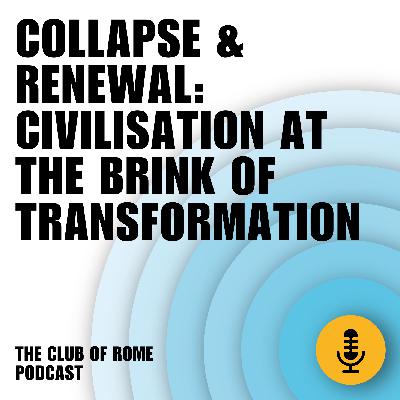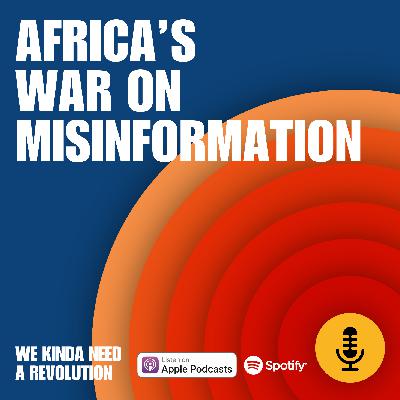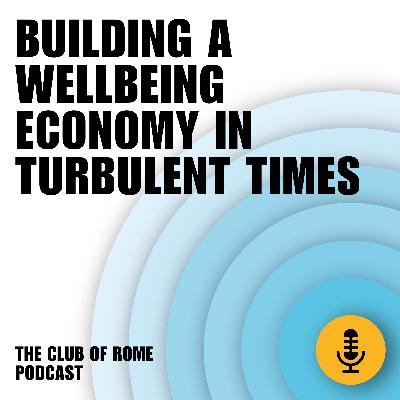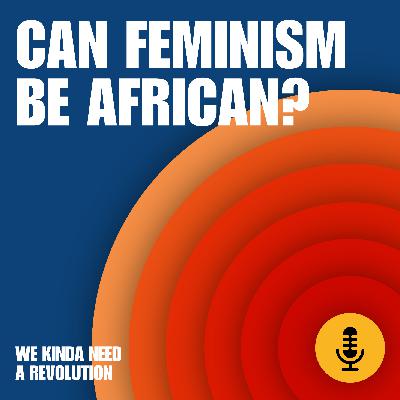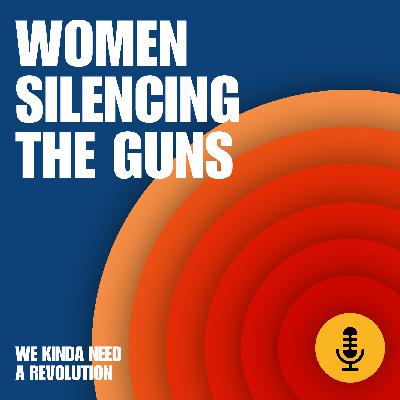What needs to change to ensure climate action? Sandrine Dixson-Declève, Laurence Tubiana and Philippa Nuttall
Description
Heatwaves and floods dominated the headlines in the summer of 2024. This lived reality of climate change is taking place against a backdrop of political shifts as far-right parties across Europe win shares of the vote that would have been unimaginable only a few years ago.
To uncover what is happening and explore what campaigners, politicians and businesses can do to ensure climate action in the run up to COP30 in Brazil in 2025, Philippa Nuttall spoke to Laurence Tubiana, CEO of the European Climate Foundation and a key architect of the Paris Agreement, and Sandrine Dixson-Declève, co-president of The Club of Rome and executive chair of Earth4All.
Sandrine and Laurence discuss the growing trend of right-wing politics in Europe and its impact on climate action, emphasising the urgent need to address social inequality and injustice in the energy transition. They highlight strategies for accelerating a globally just transition and call for a comprehensive reform of COP and climate governance to ensure effective implementation of the Paris Agreement.
Watch the video:
Full transcript:
Philippa: Welcome to the Club of Rome podcast exploring the shifts in mindset and policy needed to transform the complex challenges facing us today. I'm Philippa Nuttall, a freelance journalist and editor of Sustainable Views, and in this episode, we're discussing the road to COP30, which will be held in Brazil next year, and what needs to change to ensure that timely climate action is agreed and implemented.
With me today I have Laurence Tubiana, CEO of the European Climate Foundation, and a professor at Sciences Po in Paris. Laurence previously chaired the Board of Governors at the French Development Agency, the board of Expertise France, and is best known for being France's Climate Change Ambassador and Special Representative for COP 21 and a key architect of the landmark Paris agreement. We also have Sandrine Dixson-Declève, co president of the Club of Rome and executive chair of Earth for All. Welcome to both of you today. Thank you. So Laurence, I'd like to start with you. In 2024 we're seeing heat records broken constantly. We've had many months where the temperatures are 1.5 degrees above pre industrial levels. And yet, in many countries, we're seeing people vote, including in France, for parties which whose vision is not aligned with with climate action, who want to slow or even halt climate action. And even if these parties are not, perhaps getting the support that they expect, that they're still there. And we've seen a swing very much to the right, and even the far right, in the European Parliament. Could you explain to us a bit what you think is going on here, and how much perhaps poor communication or mixed messages around climate change are responsible for what we're seeing?
Laurence: I think first of all, this trend towards the right-wing is, of course, now a trend that is distributed across many, many countries, including mostly in Europe, but not only in Europe, as we see in United States and other countries at the same time. It's a probably more nuanced evaluation, because you see in some countries where very much pointing to the right-wing has been showing other direction as well. And Poland is a good example. In Europe, we see the resistance and of Spain and the more progressive parties. So, it's a mixed bag, but you see that the polarisation is there. And I think there is a big element of understanding for that. We have inflation. We have the problem of security because, of course, of the invasion of Ukraine, and of course, these incredible energy prices that have damaged so much, not only to consumers accusative power, but as well the industry and the economy, but the sense that we are missing a very, very important social element in all this, that people feel marginalised. They feel not listened to. They feel that they are not represented. And I think that is a main issue for the climate community at large, the climate policy in general, that the social element should be the first entry point to this big transformation of society we are aiming at, and it cannot. It had been discarded. It has not been taken seriously enough so people legitimately think that they, and that a number of poles are signaling it, that they are paying for the reduction of emission that others are finally the origin of. And in particular, of course, the more affluent people, the higher middle class and even the higher income households that are finally polluting much more than they are, but they are paying the cost for it. So, I think this social dimension is certainly now that's a big moment to rethink all what we do in terms of climate policies. So, it's not only communications even because people feel the climate change impact, but they feel the solutions are not fair. And just one example, you pay a lot of tax on your gasoline when you drive, but then you don't pay any for the one who are flying all the time. So that, I think, is a justice element, and the social element is a key element, in my view, and that's why we see that in France, and the economic insecurity, if you add on that, that you have recommendation that you have to change your boilers or to go to electric vehicle you cannot even buy. And you know, it's a very interesting study recently by OECD, people who have access to mobility and collective transport care about climate change. The people who don't have access to public transport, they tend to deny and don't want to talk about climate change. So, you know, it's a problem of access and fairness much more than anything else.
Philippa: Yeah, no, I think that's come out really clearly in the elections in terms of the pushback. We've heard a lot of this that it's not fair and people shouldn't be paying for the energy transition, especially poorer people in society. And how do you think, why do you think this message has not got through? I mean, the just transition has been mentioned as part of the energy transition, but perhaps not as a core point. And why do you think this message has got lost? And how do you think this can now be changed? Is this something that needs to happen at a national level, or is it something that can work through the international process?
Laurence: Why are government afraid? Because, in a way, I must say, most government hasn't taken the issue of social fairness and justice really seriously enough. Because the trend on the evolution of the economy is a consensus on, you know, that finally, inequality was not a big issue. And so, the response to that, look at the reform of the tax system, for example, that we are now currently discussing at European level. The government doesn't dare to go in that direction for the moment. So, in a way, the only thing they can offer is, you know, more right-wing type of argument, like immigration is a big problem, where, in reality, social justice is a real problem. So, they don't want to reassess the model, and then they don't have the tools or the mindset or the philosophy, the political philosophy, that they can respond to the issue. So, the main, and that has been very, very evidently, even in France, the main response was to talk about security in the hard terms, police and, you know, control and immigration, when they should be talking about social justice. And that, in my view, a contradiction. If we continue doing that, we will never, never have an ambition climate action at home. So, it's a very crucial juncture point. And that's all, of course, all the battle we have in political terms in France these days.
Philippa: Thanks Laurence. Sandrine, the Club of Rome and Earth4All, you've done lots of work around the importance of inequality and social justice. Do you agree with the conclusion that Laurence has come to, and how do you see that this discussion or these policies can now change?
Sandrine: I completely agree, and I think that what's, I must say, a bit disappointing is that we're in a situation, at least at the Club of Rome as saying we warned you and we told you, so if you look at the Limits to Growth, and if you look at the culmination of social and environmental tipping points, which were already pretty much drawn out in our scenarios in 1972 where we indicated that in the 2020s we would start to see these pressure points. And then I think the culmination, obviously, with the polycrisis, exactly as Laurence indicates, and the impacts have made it really difficult at this time to put in place and roll out the climate legislation and the climate implementation that we need. So coming back to the core of the issue, which is the inequality in the poverty issue, better understanding actually what leaders need to do at this time is fundamental for people like ourselves, people like Laurence trying to actually guide our policy leaders so they don't get caught with their pants or their skirts down, as we say, and really have the solutions that they need. And we have to remember that the yellow vest protest was truly a protest, both about wealth issues, because several weeks before, the wealth tax that had been proposed was actually eliminated, as well as a diesel tax issue. And when we look at most of the data that we have from a variety of different sources today, what we see is really interesting, and we've done an analysis of this also because we've been working directly with President von der Leyen's team on communications. One, most people, exactly as Laurence says, understand climate change is here, and they're suffering. They're ready to pay their fair share. The issue is, what's fair, when we see 2.8 billion windfall profits by oil and gas companies per day globally, when we see that actually, we don't and we're not able to pass a wealth tax, when we see that we continue to give subsidies to fossil energy, but not actually to ren


